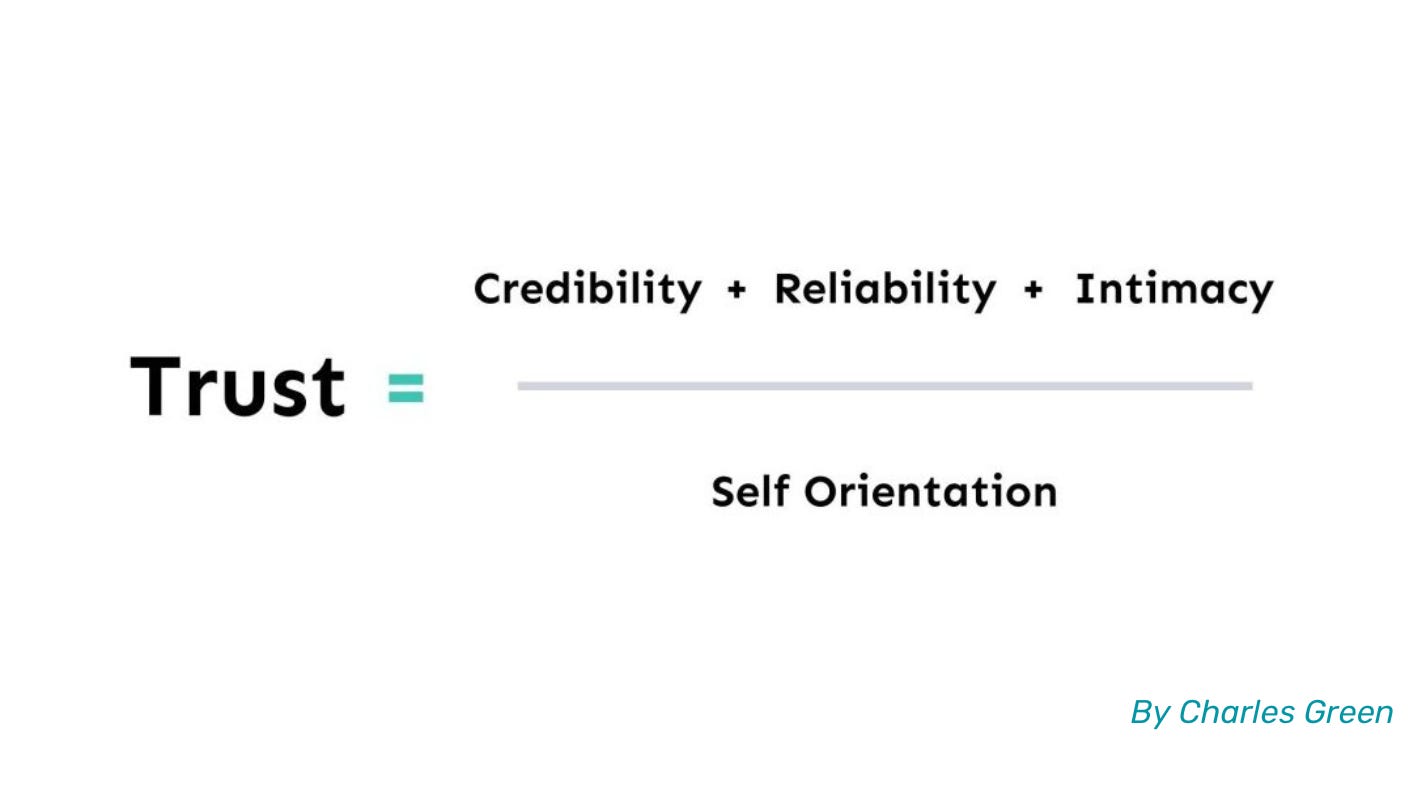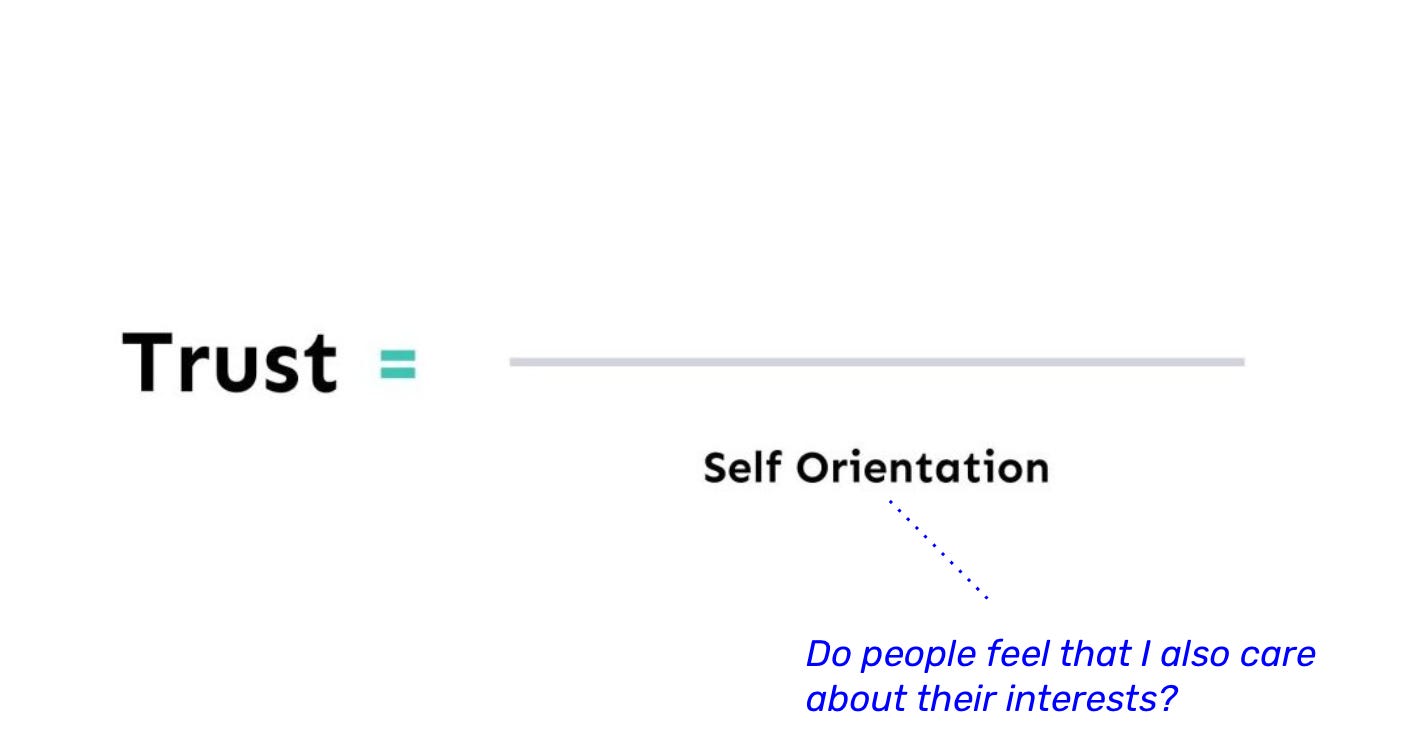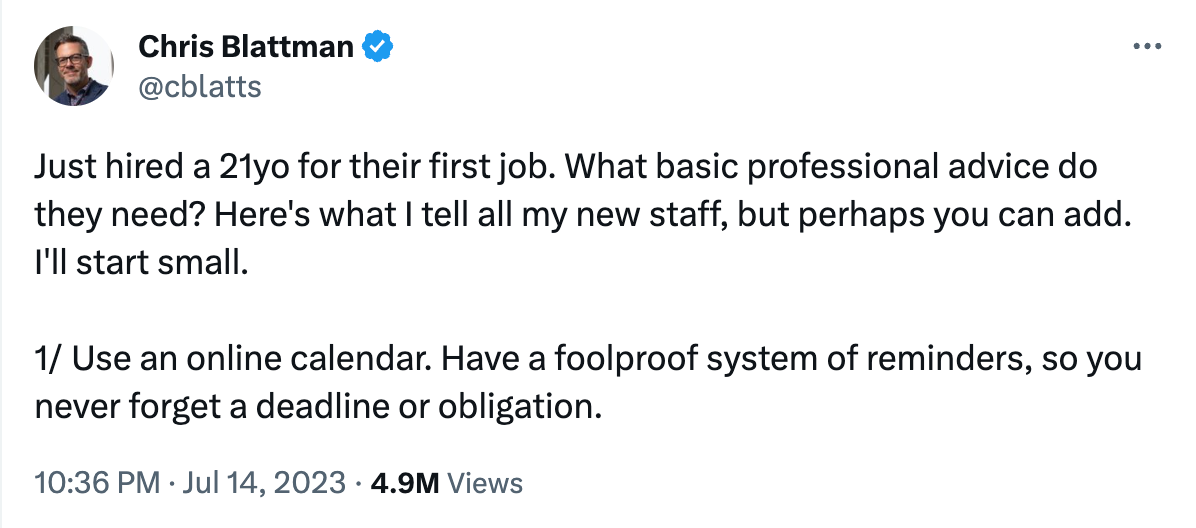Issue #33: How to build trust with your Stakeholders, New skills to learn, and 5 things
Building a trusting relationship with our stakeholders is important. But how?
Hola friends! 👋
This week’s thoughts and feelings include:
How to build relationships based on mutual trust with your stakeholders
(FAKs or Folks.Ask.Kax) What skills should we focus on as we continue to upskill in Product Management?
5 things to help you this week
1️⃣ How to build relationships based on mutual trust with your stakeholders
I’ve always found the expression “manage your stakeholders” so… transactional. For me, it removes the human and all of the nuances that exists between our bones
So over time, I’ve reframed this responsibility instead to say:
“Don’t just manage your stakeholders, instead, aim to build relationships based on mutual trust.
A reframing that’s rooted in my ideal scenario:
Spend more time creating value vs navigating toxic office politics
Come to a mutual agreement based on a common goal and worry less about influencing and negotiating decisions
Turn to reality a personal value “win together, lose together” vs just being an inspirational quote
***
When I was working in Philippines, our definition of stakeholder management was: keep them happy at all costs! And keeping them happy meant:
Say yes to their every single needs
But if we can’t say yes, treat them to expensive meals
And buy them gifts so they’ll also reciprocate and give us what we want.
Some might call it bribery. 😅
Then I moved to Barcelona, got exposed to a different work culture, and got a manager who probably wouldn’t sign off on expenses meant to appease unhappy colleagues.
So I practiced what the books said about stakeholder management.
I clarified expectations
I communicated regularly
I aligned with them on priorities
Etc etc etc
But some stakeholders were easier to “manage” than others.
With some stakeholders, disagreements and conflict didn’t feel uncomfortable. But with others, saying no to certain things felt like I had to prepare for a criminal trial.
When mistakes were made, some stakeholders would give strong feedback but would also acknowledge their misstep. Others would immediately escalate and accuse me and my team of bringing dishonor to our families and to our cow.
I employed the same strategies for all stakeholders, had the same processes, and provided the same level of transparency. So WHAT was the difference?
Of course the answer was - TRUST. Or the lack of it, in some cases.
How was I able to build trust with some stakeholders and not with the others?
So I googled. First for a definition of trust that made sense to my stakeholder situation.
A definition I thought was appropriate because at the end of the day, our stakeholders are choosing to risk what they value and putting them in our hands.
Their goals
Their time and capacity
The execution of an important initiative
Sometimes though, our stakeholders, especially when they’re our colleagues, have no other choice but to put their trust on us. But this “trust”, if you can call it that, is weak. I prefer to call it an obligation. And the signs are clear:
Taking too long to commit
Giving unrelastic expectations
The slightest hiccups lead to panic and micro managing
When real Trust isn’t there, you will feel it.
***
The thing with trust is that we can’t make people trust us. It is a choice they have to make on their own, after all. It also takes a whole lot of time and effort to earn.
But I wondered if I could create an environment for my stakeholders wherein the right conditions are present so they can choose to trust me.
Can I build trust intentionally?
So of course I went and googled. Again. And I found this framework.
Trust is the sum of showing credibility and reliability, having intimacy, over our self-orientation. What?
Let’s break it down, shall we?
Credibility and Reliability - As Product people, we’re good with showing credibility and being reliable. It’s pretty much part of the job description.
We show credibility through the data and insights we gather and by the expertise we have on our domain, our market, and our industry.
And we show reliability through our commitments. We keep our promises when we can. And when we can’t, we are upfront about it.
This is the easy part.
Intimacy - About people feeling comfortable to talk about sensitive and difficult topics with us. Or feeling comfortable to show vulnerability. But how?
It has to start with us. For other people to start feeling comfortable to show us vulnerability, we start with showing vulnerability to them.
I don’t mean start talking to stakeholders about the most private and personal topics going on in our lives. But sometimes it’s the little things:
Answering honestly the question “how are you?”
Being upfront about the things that I was worried about
Being unafraid to say “I don’t know” or “I don’t understand”
It felt weird in the beginning to do this consciously. To be honest about things that touch upon feelings, even if they were about work, to people who are not my friends. Then signs of results started to show and — it was worth it.
Self-orientation - What do we care about? Only our own goals? The impact of success or failure on ourselves? And how obvious is it to other people that we only care about ourselves?
This doesn’t mean stop caring about our goals. This means to also care about our stakeholder’s goals. Because they matter too. Especially to them.
So how can we show that? At least here’s how I did it:
“What can I start doing/keep doing more of/stop doing to help you succeed?” I started framing my feedback requests this way - centering on what they need.
I started talking in “WEs”. An acknowledgement of the fact that, at the end of the day, we’re a team. We might not have the same priorities or ideas, but we’re all working towards the same goal - to contribute to making our organization a successful business.
I realized that helping them succeed can come in many forms. I might say no to initiatives and priorities. But I can still help in the form of insights, context, or any other information that might help them move forward with their own goals. Or sometimes it’s something as simple as not making them jump into a call at 6am their time just because it’s convenient for me.
***
There’s probably a lot of other things that can be done to build trust. It’s constant work after all. Like we do with friends and loved ones. We constantly work to make the relationship good.
And we don’t do it through grand gestures alone. We also invest in the small things. Moments where we can show them that we care.
And we can absolutely show our stakeholders that we care. I did.
As a result, I started seeing changes in my stakeholders’ behaviors.
They started asking for my input more and more.
My Nos were no longer met with violent reactions or worse… escalations
And there was willingness to move towards a way of working that allowed for more open collaboration rooted in shared goals and prioritized common problems to solve.
And while I’m not saying that I have the best relationships with ALL of my stakeholders. I’m not saying that we should be best friends with them either.
But how I’m seeing it is that investing effort in building a relationship that is rooted on mutual trust is oftentimes going to give us the biggest return vs constantly iterating on ways of working and/or processes.
Because when you show people that you care about them and their context, they will care back about you and yours.
***
As Product people we are taught that in order for us to build successful products, we need to emphasize with our users.
But sometimes we overlook the importance of emphatizing with the people we work with. The same people we can’t make our products successful without.
And when there is trust between us and the people we work with, miracles happen.
Requests can turn into shared goals
Influence and negotiation can become conversations about what will bring the biggest value for everybody
Wins and credit are shared. As well as accountability.
How do you build trust with your stakeholders? Share in the comments below 👇
2️⃣ (FAKs or Folks.Ask.Kax) What skills should we focus on as we continue to upskill in Product Management?
Sharing full question here for context:
Hey Kax, with new techs on the rise right now, I wonder which one should we be more adept with. There's a lot of conversations on the rise now about AI and blockchain. And there are still some skills that PMs should have like a bit of Analytics, Data Science, UX Concepts, and whatnot. As a PM, what skills should we be focusing on as we continue to upskill in Product Management?
Everyday there’s a new topic that comes up that triggers the Product community into thinking “we need to learn all of these!!!”
But we can’t.
To learn something takes time. And I would like to think that we have lives outside of our Product Manager roles that we should also invest time in.
So instead of answering this question with a single topic, let me answer this question instead with a good old IT DEPENDS!
I think it always starts with what you are optimizing for.
Are you curious about something specific?
Are you looking to focus YOUR Product Management career in a specific area?
Do you have some identified skill gap that must close so you can get to the next level?
I think it’s important to prioritize what you want to learn based on what would provide you with the most value vs prioritizing learning a topic for the sake of the topic
Some examples:
Do you want to get into Fintech? Then perhaps it’s important to understand block chain, security, and brush up in UX concepts (because UX in Fintech could always use some work).
Want to move up the career ladder and become a Product Director? Then best to understand the business side of your industry, learn some management skills, and brush up in leadership principles.
***
But there is one thing that I would insist that people need to learn — and this is to learn how to be in a continuous learning mode.
Constantly pick up things from your every day life and learn from them!
Watching the news? Understand how current events might impact your industry.
Trying out a new app? Do a product take down exercise in your head.
Working with cross functional experts? Understand what they do and how they do them.
Sharpening your ability to learn will help you learn new skills fast and with less effort than constantly reading all the books and enrolling in all the courses.
Do you have questions about Product Management, about growing in your career, or anything else that’s been in your mind that you’d like to get some insights on?
Leave them in the comments below OR send me an email hello@kaxuson.com
3️⃣ Five things to help you this week 🤓
Jackie Bavaro shares a list of skills that help Product Managers grow as they become more senior. (Hint: Building Trust is one of them!)
Adam shares how to rally a fractured organization using the North Star Framework
The latest newsletter post from Cristina and Jenni on great managers vs average ones.
Bruce McCarthy’s take on saying NO. What do you think?
Before you go!
Are you struggling with your job search right now? Your application is being ignored? You get feedback along the lines of “We’re just looking for somebody with more experience”. Get my ULTIMATE GUIDE for creating a Sustainable Job Search system for the Modern Product Manager. My newsletter subscribers get a 10% OFF 😎
See you next week!
💙 Kax









